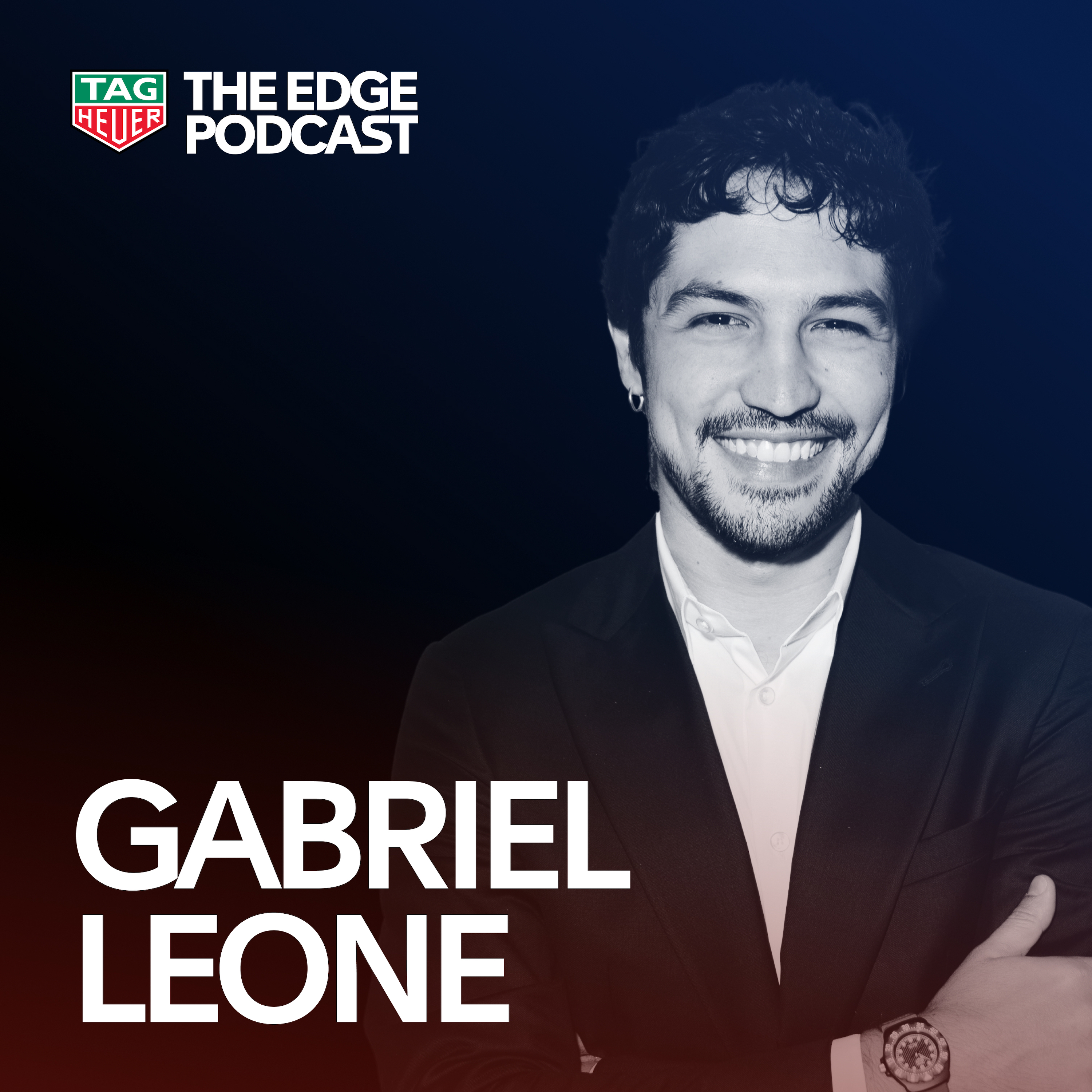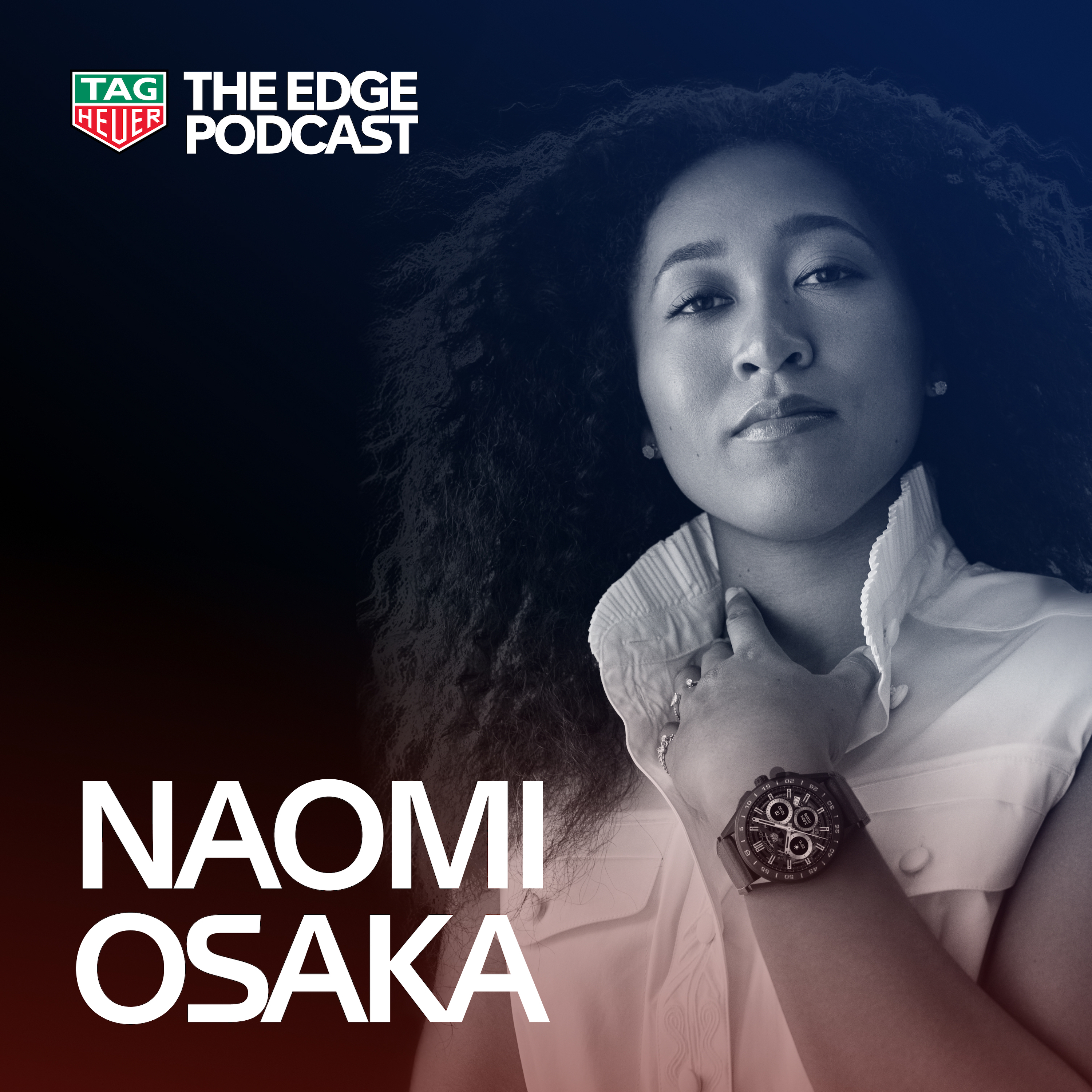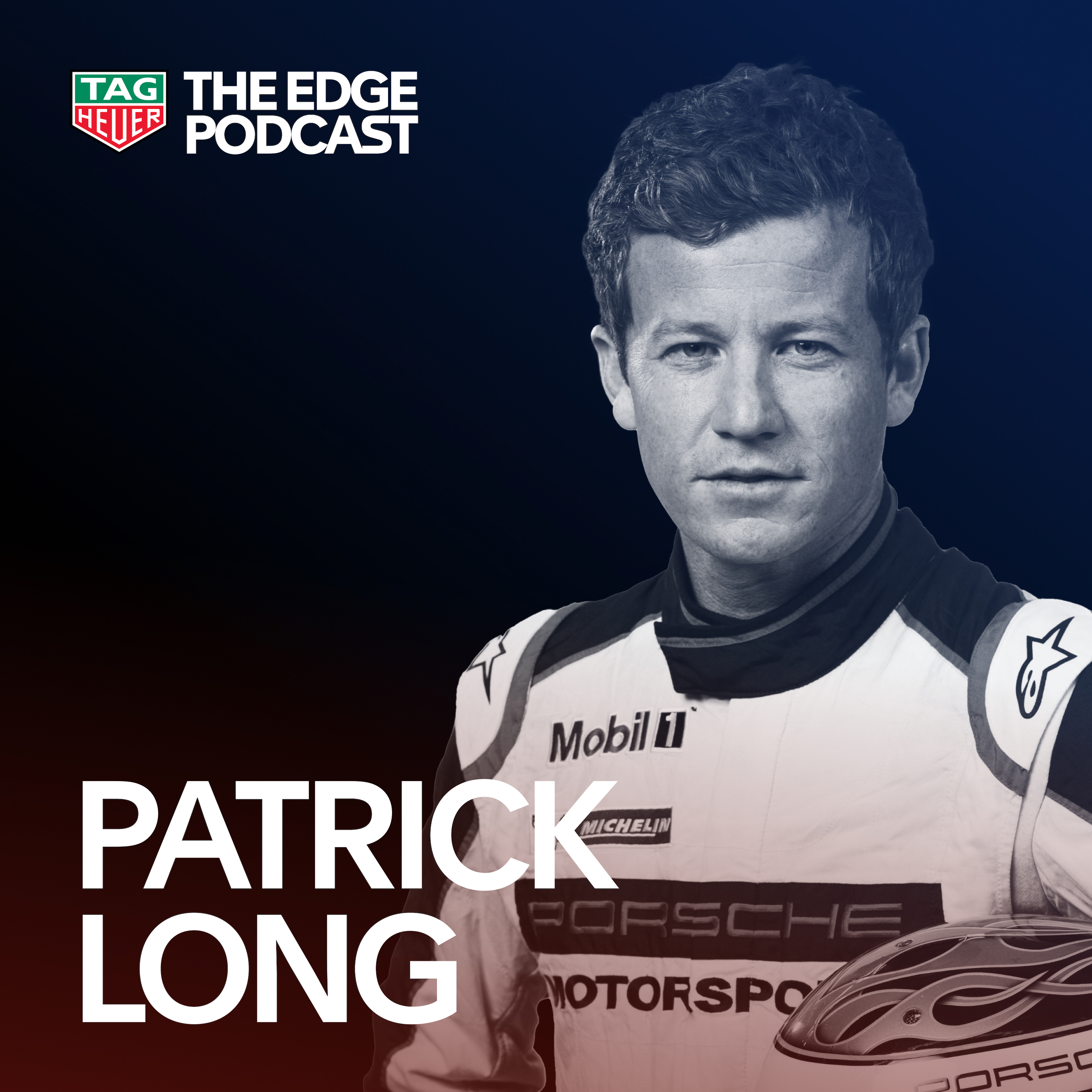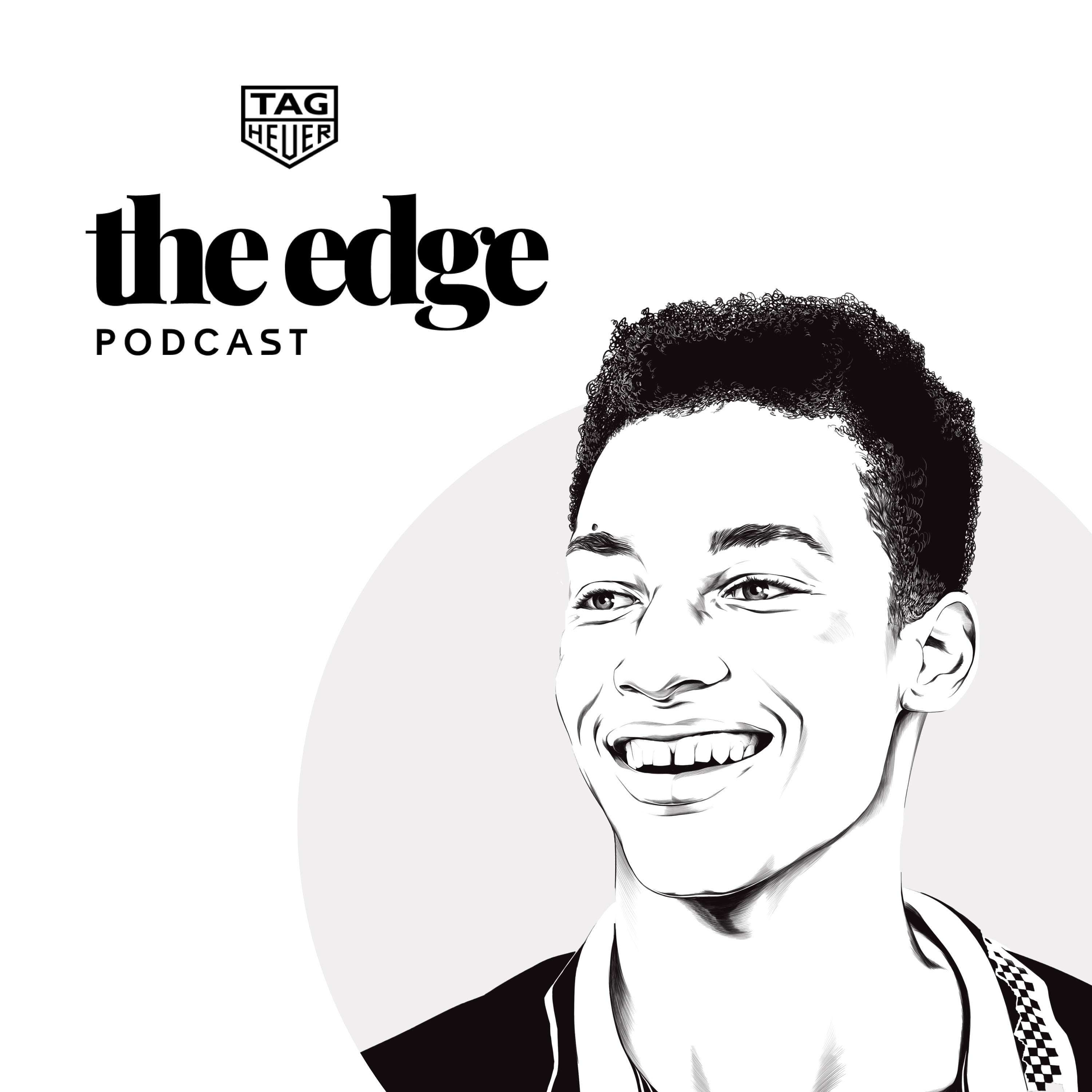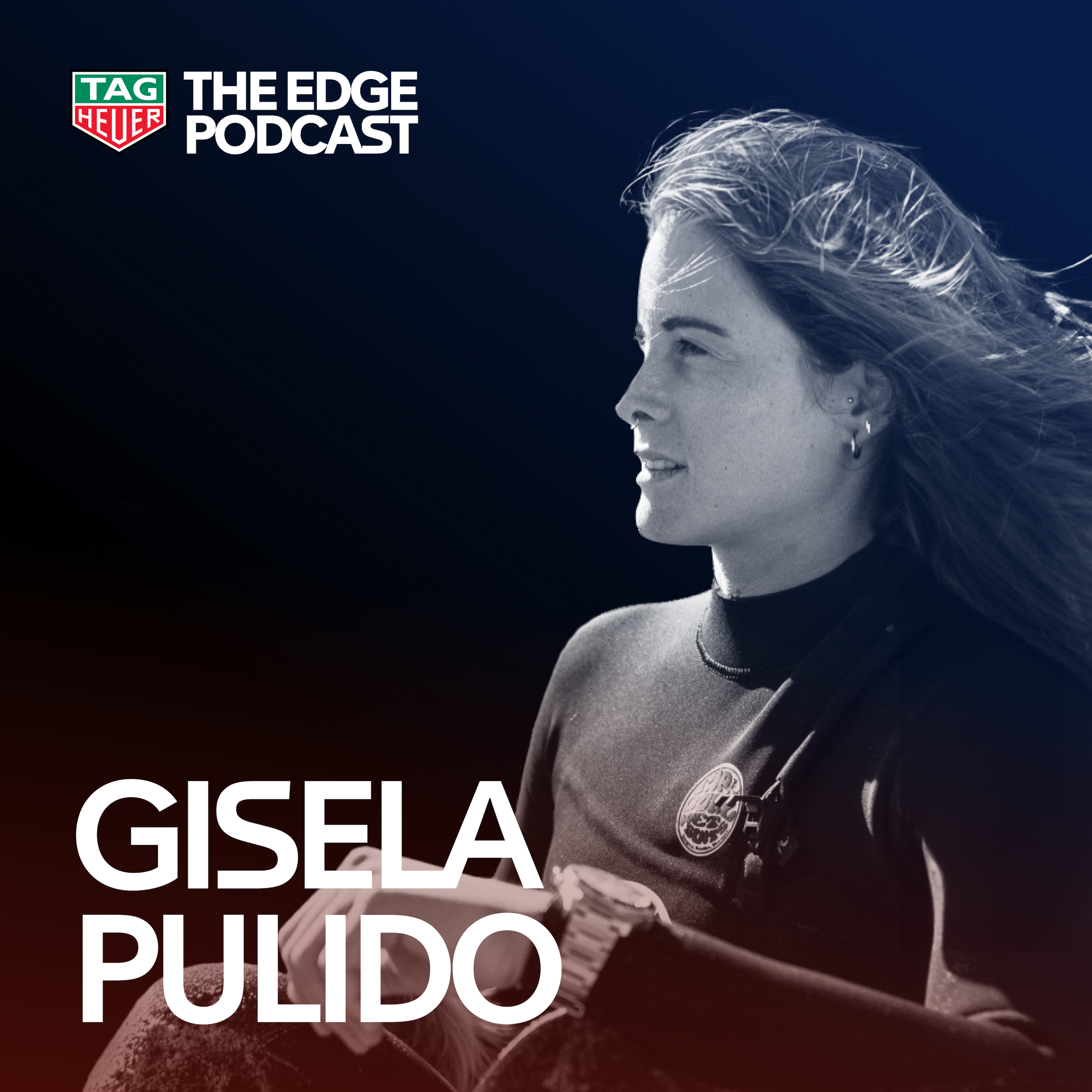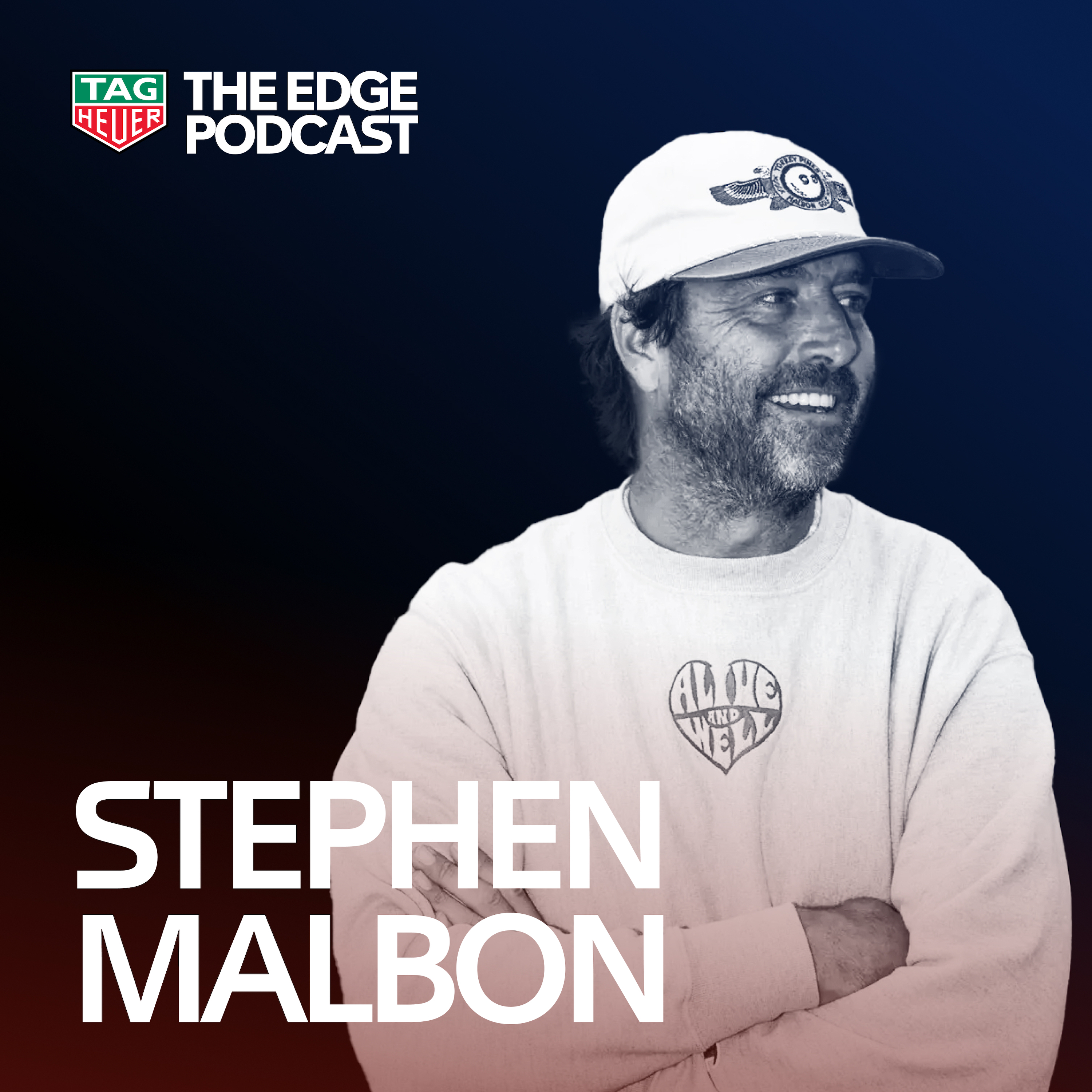Episode Transcript
[00:00:05] Speaker A: Welcome to the Edge, a podcast by Tag Heuer. Our guest this time is actor and musician Gabriel Leone. In March 2023, Gabriel was cast as Formula One legend Ayrton Senna in the upcoming Netflix series Senna.
In this episode, Gabriel talks about how he approached the role, the challenges, the thrills, and the nuances of playing such a universally loved sporting icon.
He also tells us about what Senna means to him and the moments that shaped his own career. I'm your host, Naomi Schiff, and this is the Edge, a podcast by Tag Heuer.
[00:00:51] Speaker B: Well, Gabrielle, thank you so much for joining us on the Edge podcast today. It's actually quite funny because we bumped into each other a few weeks ago or a week ago at the Brazilian Grand Prix. So it was perfect timing ahead of.
[00:01:03] Speaker C: Today'S podcast and at Tagore's even.
[00:01:06] Speaker B: Exactly the night before. Exactly, exactly. We saw each other at the event, and then we saw each other at the track. So I got to see a little bit of you before we get to have our conversation today. So are you still in Brazil or where in the world are you right now?
[00:01:17] Speaker C: I'm still in Brazil, yeah. I'm actually at my hotel right now. We just finished our junket for the series yesterday, so it's been, like, almost the entire past week working to promote the series.
[00:01:33] Speaker B: Awesome. Okay, so you've already told me what you're there for, but could you just tell me a little bit about where you grew up, because you are obviously Brazilian, but are you still in Sao Paulo now, or are you back in Rio where you were born?
[00:01:43] Speaker C: No, I'm born and raised in Rio, and I'm based in Rio.
[00:01:48] Speaker B: Okay, awesome.
[00:01:49] Speaker C: So. But actually, now I'm here, and then, as I told you, I'm shooting the series in London right now. So in a couple of days, I'll be back to London to shoot it.
[00:02:00] Speaker B: Fantastic. Fantastic. Now you're telling us you grew up in Brazil. Brazil is a country that I absolutely love, but I don't know a lot of actors that come from Brazil, and maybe that's my own ignorance, but could you please tell me where your love for acting came from?
[00:02:16] Speaker C: I probably. I think you probably must know Wagner Maurer. Have you heard of him? Narcos?
[00:02:23] Speaker B: Oh, yes, of course. Yes, of course.
[00:02:26] Speaker C: He played Escobar in that show. And also Alice Braga is also well known.
She did like Queen of South. I think it was a big hit in the US but anyways, like, I'm just saying because they're amazing Brazilian actors and also friends of mine So I started acting.
I always say I started by accident because I was in school. I think it was like first or I think first year of high school. And there was this teacher of us that was a retired actor, history teacher. And he.
He asked us to produce a play about Brazilian history. So it was one day presentation for the parents and for the teachers at school. And my class chose to produce a play about this famous Brazilian singer called Cazuza. He was well known during the 80s, not only because he was amazing, but still because he died. He was one of the first artists that died in Brazil because of aids.
So. And I, just because I was a huge fan of him, I suggested myself to play him. And the class decided for me to do it. So I did it. It was one night only presentation for parents and teachers. And I kind of felt better than any other place I've ever felt. When I. When I was on stage for the first time, even if it was totally amateur, but still, to me it was. It was crazy, the feeling I had. And there was a theater director from my school that used to run a theater company. So he heard of my performance and he was like. He invited me if I wanted to start following his company and the rehearsals. And so I did. And a month later he invited me to join the company. And I was debuting, doing. And my first play with them was the Tamian of the Shrew. Shakespeare's. So yeah, that was it. And then it was just like work after work, lots of theater, and then started auditioning for TV and movies and stuff. So now it's been, what, 16 years of career?
[00:05:15] Speaker B: That's incredible. And it also sounds a little bit like it all happened very quickly. At the beginning, you just almost just found out that you had a passion for this and someone gave you an incredible opportunity. So would you say that from that point onwards when you joined the company and started doing more performances with them and, you know, casting for real jobs, that at that point already you knew that you wanted to be an actor forever?
[00:05:38] Speaker C: Not in the first play I did, but the second one, there's like. There's usually the companies have their first actor and first actress, and they're usually. And they, at my. In my company, they were older than me. So the first play I did, I was kind of hooky. So I did a great. I had a great role. But the next play we did, they needed the two leads. It was a Brazilian musical created by an amazing composer and singer, Brazilian one called Chico Guaji. He wrote a play based on media. I Think. I don't know. I'm not sure in English, but it's like the Greek tragedy.
And he sat the play during our dictatorship, so we needed to have an older woman and a younger guy to play the couple. So it was kind of lucky of mine. So right in the second play I did with them, I became the lead.
And at that point, I remember we started, like, going for some festivals and stuff, and I started having some great feedbacks of people saying, you're young, but you're talented, so keep on doing, keep on working. And I think that was the first time for me and for my parents that we started realizing that I could have something special about that.
It was when it started, it started to be more than a hobby, you know, and so on. So, I mean, years later, I think I realized that that was the only good thing I know how to do in my life, you know, Very, very humble.
[00:07:35] Speaker B: I'm sure there's a lot of things that you must be really good at. So just to put things into perspective, because obviously you said you were in secondary school when this all started, but how old were you at this point when you got this role that you would say was like the catalyst for you and your parents? Real.
[00:07:49] Speaker C: 16.
[00:07:50] Speaker B: 16, right.
[00:07:51] Speaker C: Okay, 16.
[00:07:52] Speaker B: Okay. So that's still very, very young. And did you guys. I mean, besides the fact that you understood that you had a passion and a talent for it, did you think then that it would be a feasible career? Because I know acting, I mean, there's not very many opportunities and a lot of people who want to be actors, so sometimes you have to go through a lot of hard times before you. You land a big job or something like that. So did you guys already feel then that it was going to be a feasible career for you?
[00:08:19] Speaker C: My parents were always supportive to me, but they knew what you just said. They knew how hard this career is and how competitive this career is, how few opportunities you have to make your life as an actor. And that's why they asked me to have a plan B. So I did college. I did graphic design college while I was working with my company, but I didn't even finish the college. I stopped. I quit one year before finishing it because that was when I get my first role for tv.
So I never went back to college, never looked back.
[00:09:16] Speaker B: And it's a good thing you didn't, because clearly the pathway you've chosen is the one for you and something that you're incredibly good at. And lots of people have spotted your talent and therefore given you Opportunities. Now, we're going to fast forward a little bit to March 2023, when Netflix announced that you'd be playing the role of Ayrton Senna in a new series about the Formula one legend. Now, can you just, first of all, tell us how you got the role? Tell us what the process was.
[00:09:41] Speaker C: Well, the first time I heard about having someone producing a project about Sena, it was 2018. I was having a meeting with the director at Gulani, which ended up being our production company for the series. So we were having this meeting about another project. But in the middle of the meeting, one of the owners of. One of the owners of the company, friend of mine, we were working together for. We've been working together for a long time. He pointed this script that was on his table saying, we're thinking about you to this one. And it was written Senna. So that was the first time I started picturing myself at playing Senna. But then, as you know, pandemic happened, so everything was suspended, schedules changed.
So life went on. And cut to 2022. I worked.
I have worked with the director of the series, Vicente Morin, before Santa, and we got along pretty well, and we were looking forward to work to collaborate together again.
And so 2022, he called me saying I just signed with Netflix to direct the series about Santa. And he was like. I said, I mentioned your name to play him. And both company and Netflix agreed with that. But we'll have to have you tested, like a presentation test for Netflix us, and also to be blessed by Santa's family.
So that's what I did. And it was like weeks before I flew to Italy to start shooting Ferrari, the movie. So I did the test. It was like, I think, four or five scenes. And we had some hair and makeup and costume. Really experimental.
It happened one year before the real shooting. So it was just really to present me, to send them an idea of where we all could get, having me playing Senna. And that's what happened. I mean, I went to Italy, I was prepping for Ferrari, and when they. I got the call saying they chose me to play him, I almost exploded in happiness. Yeah. And that was it. I think weeks later, I had the zoom with Santa's family, and they were like, blessing me to play Aitan. So it was fantastic. I remember calling my parents because I'm one year. I was one year old when Senna died. Actually not even one year old.
I was born in 93, so I barely remembered anything even if. But I grew up in a family of Senna's fans. So can you imagine when I called my parents saying I'm going to play?
It was massive, not only for me, but also for them. Huge emotion.
[00:13:19] Speaker B: So the answer to that question is no, I absolutely cannot imagine what that must be like.
I mean, to be honest, as a former racing driver myself, I always find it magnificent or amazing to see how 30 years on, as you say, Senna passed in 1994 on the 1st of May. I find it incredible to see how his legacy has continued to live on in the homes of people as if he was still around. So I totally understand the power of Senna, but even more so to Brazilian families. So yeah, just talk me through your emotions because I know you said you were about to explode, but truly what did that mean to you in that moment to hear that you were going to be playing his role and maybe even when you were experimenting with hair and makeup, like looking in the mirror and thinking like you were going to be Senna for this, for this role.
[00:14:06] Speaker C: Yeah. So when I got the new, it was a year before shooting, so I was, I had to let it go for a while, you know, because I had to focus to concentrate on Ferrari, the work I had at that point. And actually after Ferrari, I did two other jobs, two other way different characters before I played Senna. So it was like, my God, I can't believe gonna be playing him.
But let's just forget about it for a while and keep on working, keep living. Of course I was, I mean I couldn't, of course I couldn't forget about it. But just to say, focus wise, you know, so 2023, I did the third season of this series for Prime Video, also a Brazilian series, third and last season I did it and it was crazy because the character I played there was also a real guy and he couldn't be more different from Santa.
Santa was born in Sao Paulo, that guy was born in Rio, just like myself. And I was blond at that time. And the guy was like a criminal addicted to cocaine. You know, his energy couldn't be more different from Santa's. So. And like two weeks after I wrapped this series, I flew to Buenos Aires to start prepping for Santa. And to be honest, I don't look at myself and instantly see Santa on me, you know, I mean, I think we have like maybe the same profile, I'd say, but it's not like just like people have been saying now that Colapinto really looks like Santa, you know, his hair and his face expressions and his style and stuff. So I don't think.
I don't think. I don't feel the same with me. So I remember started looking at myself, trying to find Santa in me, and it wasn't easy. Definitely. Definitely. I mean, now I can say it was definitely the biggest challenge of my career. It was.
It was tough, especially because, just like you said, because of how Santa is still remembered all over the world, how people still idolize him and remember his physicality and his voice, his energy, his. You know, and you have, like, loads of material out there, videos and stuff of him. So I knew from the beginning that I would have to work my best to be as similar as possible as him, you know, for people to look at me, to people to watch me and identify in Senna, for that. For they. To immerse themselves in the show.
So it wasn't easy, for sure. But we worked a lot. We experimented a lot. Like, we tried wigs, we tried all that stuff.
And the key we found to make me look more similar to him was our makeup designer is just a genius. He's amazing. And he started making my main characteristics up. So he was kind of erasing myself, making me. Making me as a. Like an empty page, a blank canvas for them to start finding and brushing myself, Santa's smallest details, you know, and we. And we were trying a lot, like, with the hair and all that stuff. And so I remember one day, like, a couple of days before starting shooting, we had, like, a TAS camera. So we went to set and we were like, we had the whole team and costumes and hair, makeup, all that stuff. We were really, like, shooting for real, but not shooting.
And someone took a picture of mine. I was waiting, like, on the outside, holding a cup of coffee, and sent me the picture later. And I remember looking at the picture and thinking, I found him. You know, it was the first time I looked at myself and I saw Senna. So. And that was really important to me because that made me. That made me and of course, the whole team confident that we got to this image and that then that we could live. Then we could start our journey, living his most iconic moments of his life.
And of course, I'm just talking about physicality, but of course, I was doing all the research, reading, watching, talking to his family, to people close to him, and trying my best to find his essence. Of course, all the interior of Santa. And just to be short, I found it paying attention at his eyes.
I started really focusing on his eyes in any videos I found of him, you know, because I think Santa's Eyes and the way he looked really reveals who he was, you know, and his essence, his feeling, the human being behind the driver.
[00:20:18] Speaker B: Yeah, it's a powerful, powerful gaze, as you say. It sounds like the challenge, and I've never been put in this position, but it sounds like the challenge of identifying yourself with a character that you're having to play will always be challenging. But it sounds like if you look half the part or look more than half the part, then you automatically get a little bit more confidence to dig deeper into the other things. So when it comes to the research that you did and, you know, some of the things that you had to take on board to become mentally more like Sena and physically more like Senna, were there any maybe particular mannerisms or quirks that you picked up of an old footage or little habits that you found having had to research the character of Senna that you could share with us?
[00:21:02] Speaker C: Yeah, there are a couple of it.
One interesting was that Santa has a facial half of his face. Got paralyzed.
[00:21:21] Speaker B: Okay.
[00:21:23] Speaker C: He had an infection. He had an infection. And so he stayed for a couple of months not moving half of his face.
So then I think it was the right one. So then he started compensating with the other side to eat and to talk. And so he got better. That's why people barely know about it. But then he kept.
When he smiled, he kept doing something like this for the rest of his life. You know, it was really subtle.
[00:21:59] Speaker B: Like a little corner smile in the corner of his mouth on the one side.
[00:22:02] Speaker C: Exactly, exactly. Exactly. But it wasn't intentional. It was because of the. Of the infection he had, you know, so the smallest detail. So I kind of kept the whole past. The whole last year smiling like this because.
And also I think that something. Now that I've watched the show finalized, it's interesting to watch me watch myself and listen to myself.
Senna had a really specific tone of voice and candidacy when speaking. And I researched it a lot. I experimented a lot, of course, never always avoiding imitating him, especially because when I was getting close to his voice, to his original voice, sometimes it didn't work for the scenes. And this is something important to have in mind.
We did a fiction. Of course it's inspired in his life and in.
In true Stories, but still is a fiction.
It had to work as a script, as a series, as a series, for the format of a series. So of course, we had to have adaptations and choices, artistic choices.
And so it was always about finding the balance between the real The. The. The.
The close as reality I could get. But what works and suits better for the series, for the storytelling, for. For. For the series?
[00:23:59] Speaker B: You know, sounds like you go into this with a lot of thought, and I'm sure that you do it with all your projects. I don't doubt that. But I want to know if there was anything maybe on this particular project that was particularly challenging, maybe in channeling Ayrton Senna? Or was it maybe something that came with more pressure, given his legacy, given the fact he's Brazilian? Just what would you say out of the whole thing was the biggest challenge for you, personally?
[00:24:24] Speaker C: I mean, I think just like we were saying, we were talking about his legacy and how important he still is to millions of fans around the world. Even when you watch Formula one, it's like people still talk about him, about his records and about his marks and about his technique, and the best drivers ever had him as an idol, you know, and the new generations have him as an idol. So he still. It feels sometimes that he's still alive. But of course, it's because of his legacy, because of how strong, how powerful his legacy is. So I think the most challenging thing was from the beginning, from when I got the new. I would play him. And then when I started prepping and shooting, the responsibility of playing a guy at this level of relevancy for the whole world, you know, I remember when I was shooting Senna in Italy, I talked. I told a few guys about Santa. I was. I was working with a bunch of stunt drivers. They almost cried, you know, when I said, I'm going to be playing Senna. And they were like, are you kidding? I started racing because of him. I started watching.
I remember myself as a kid, watching him driving the black and gold Lotus, you know, and that was. Made me want to become a racing driver. So now that I'm shooting in London, come to me on set to tell their own story with Santa and their family's stories related to Santa. So it's. It's. It's crazy. And that is. I think that's the challenging. The challenge, you know, it's to feel how big he is and how people will watch this series, wanting to.
I mean, to connect with them again, to connect with his story again. So even if I'm an actor, and like I said, it's a fiction, but still, I knew I would have to. At some point, people would have to believe I'm Santa for six episodes, you know, so, yeah, and that was. That was. That was tricky. I mean, but. But to me, as an actor, it was. It was amazing because what I loved the most is challenges and to be challenged by a character, you know, as the. More. The best for me.
And also, it wasn't only a responsibility to play San. It was also an honor to me as a Brazilian, and also because our production is definitely the best, the biggest production ever made in Brazil, you know, so Netflix was really believing in this story, and it was a Brazilian story produced in Brazil, made by Brazilians, you know, but in a level, in a world, in an international level of quality of production of, you know, so I was really honored and proud to be part of that production and to be telling him his story again.
[00:27:41] Speaker B: Yeah, I mean, it's an absolute honor, but it's also. I can imagine a ton of pressure, I think, to the racing community.
I don't have to describe how important, you know, the legacy of Senna is and how big it is, and it's the one that will forever live on. So much like you, I was born 17 days after Senna's death.
I raced for 16 years. And I have to say that when I first was introduced to the legacy of Ayrton Senna, I just remember being devastated at the fact that I would never see him race because, you know, all I do is watch racing. I go to the racetrack. I either race or I watch racing live.
[00:28:16] Speaker C: I mean, we only have. We only have videos. Yeah, and images.
[00:28:19] Speaker B: Exactly. Yeah, exactly. So through archive footage, I was able to learn of this at and Senna. And truly, I just. I always shed tears the more I watch it, because it's just. You feel sad to have missed out on something. So I'm really grateful that you bring his character back to life. And now that you managed to get to know his character better than probably any of us do, now you even know how to mimic his facial movements.
What would you say from what you learned were the qualities that he had that maybe make him this character or this. I shouldn't say character. But what. What is it about Ayrton Senna that continues to capture the imagination of fans across the world?
[00:28:58] Speaker C: I think there's no discussion on how skilled and talented and about his technique and how he revolutionized the sport as a driver. So just that would put him in a position of referencing and, you know, and idol for other sportsmen and fans. But what makes, to me, what makes Senna one of a kind is because if we. If we see him as a hero, as a legend, I think he was the most human of the heroes, the most human of the legends.
When you Watch Sena talking. When you watch some of his videos, he's so reliable, you know what I mean? Like, it feels like he could be at your side at home, he could be your friend. It feels.
I always feel so close to him, you know, so it's not. You don't have that relation of him being above, of him being more than any of anybody else. He was like this guy.
[00:30:28] Speaker B: Relatable.
[00:30:29] Speaker C: Yeah, exactly, exactly.
Relatable. Yeah, exactly. And that's what, to me, that's why so many people connected and still connect with them, you know, like all of these ideas of keeping on believing on yourself, of. Of never giving up on your dreams, you know, and like I said to you about, about his eyes, you could see that he was always being truly honest with himself and with whoever he was speaking to, and he was really opened, you know, I think that's why you could. You instantly connect with him, you know? So I think it's the perfect mix of a legend, a hero, but a human being, like an ordinary guy, you know what I mean? Like, as a human being, an extraordinary racing driver.
[00:31:33] Speaker B: Totally. Well, look, we definitely can't wait to see it and to see what you have brought to life. Although you do say it's a fiction based on true stories. Without giving us any spoilers, what can fans expect from the series on Sena?
[00:31:48] Speaker C: First of all, emotion, you know, because so many epic things happen to him. It was, I promise you. I remember reading the script at first and I was like, I couldn't believe I was crying the whole time, you know, because it was so intense, just like he was when, when racing, you know, so it's, it's this balance, this mix of action, of racing car, of speed and emotion. Emotion all the time and heart and passion we tried our best to capture because I think we all find that that was his essence, you know, he was like the most aggressive driver and, but also passionate. And I think our series. There's a couple of interesting things I think our series could give to the audiences. First, for those who used to follow him and watch him back in the days, even if we're going to, they. I mean, there's no spoiler in the series for, for people who really knows the story.
But first we were going to retell his story. We're going to show the highlights of his career with, I mean, technology and as a series, not as a racing being broadcast, you know, so it's, it's, it's about the story and not, not about the races or about the championship and More than that, I think we're gonna. We're gonna give a more complete, a more full experience, since we are, of course, there's, like, I think there's more than. There are more than 20 races in our series, but we are also. We were searching and we are presenting, like I said, the human behind the driver. So it's not only about the race. It's about the night before the race and the day after the race. How was he the night before and how. How was he right after the race? You know, so that's when I think people will have a more complete full experience, because it's not only about the race. And, and more than that, I mean, since it's a Netflix series, and I mean, I mean, the combination that the marriage of Netflix and Santa, both huge around the world, I think we're. We are also going to present Santa's story for millions, especially, like the next. The new generations that don't know his story. And I think we're going to present it through a series on Netflix. And it's a pop series. You know, it's like, it's. It's an action series.
It's a series about a hero, but as I said, about a human hero. So it's also full of emotion. It's not about superpowers. It's about values and heart and passion and this journey of a hero. A hero, a legend wasn't born like that.
So where did he. Where did he come from? You know, how was his journey, his obstacles? How did. What did he have to do to be to become who he became?
[00:35:32] Speaker B: Well, it certainly sounds like you guys are going to be a crucial part between you and Netflix and the whole show in making sure that this legacy lives on. And I guess that that's a huge challenge as well in terms of how people consume content today and what people want to see. But it truly sounds like this is going to be an essential part in that. And from everything you've said already, it certainly sounds like something that I definitely want to watch. So when is, when are we going to be able to see it?
[00:35:59] Speaker C: On the 29th of November.
[00:36:02] Speaker B: Okay. So out on Netflix, 29th of November. So for everyone listening, make sure you check it out now. Thank you so much, Gabriel, for giving us all the insight on that. I want to take it back to you because I know we're talking about your work, but I want to hear a little bit more about you.
Every actor or every person has an origin story, like a moment that started it all. What would you say, is yours.
[00:36:27] Speaker C: I remember the day before starting shooting Ferrari, they asked me to go to set to. They needed to take a picture of mine to portrait for my scenario for my room and the movie.
And I shot the movie in 2022.
And I remember being there on set and I had this suit and my character had like this.
My hair was all to the backwards, you know, like really slid back. Exactly.
And then I was on set that day and I remembered the first time I entered a set, a movie set, and it was 90 years ago from that day.
And I remember I was this kid entering a set for the first time, and I had a suit. It was a small part I was playing on tv. Just like one day of shooting, I think I didn't even have a line. I was just there being the character.
But I had a suit and my hair was also slipped back nine years before that day.
So. And I was like. I kind of got emotional thinking that in less than 10 years, I went from this first experience on a movie set to be one day to start shooting with Michael Mann, a movie about Ferrari, having a great character, working in English for the first time, being directed in English.
So it was really a moment of, you know, like, full circle of life. And I remember when I was a kid watching Michael Mann's movie with my dad, you know, way before becoming an actor, and then to be there being directed by him, I auditioned and he.
He chose me to play that part. So it was. It was kind of a lot to me.
[00:38:44] Speaker B: You know, it must be wonderful to reach the full circle moment. And sometimes for some, it takes a long time, for others, it happens overnight. But on that note, I'd love to ask you what advice you have for future actors, struggling actors, upcoming actors, performers out there.
[00:39:02] Speaker C: You know, it's hard to give advices because it's a really tough career.
And I think it. Unfortunately, it doesn't only depends on how talented you are. Just like we were talking about Senna. I think you need to practice. You need to work as hard as you can.
But also there's luck, you know, there's life. There's like.
I mean.
But if I. If I could say something, I'd say to try your best to take each opportunities you have and give your best. Give the best you could, but try not. I know it's hard, but try not to create expectations, you know, because it's. It's an. It's an important. It's a knowledge, it's. It's an important thing. After years, you understand that it Doesn't. Unfortunately, it doesn't. Only depends on you, you know, so what you have is to give your best, you know, and keep on working. I mean, sometimes you give your best, and still it's not gonna. It's not gonna come to you.
Because I think timing are different to each person, to each artist, but still, it's. It's. I think it's important to.
To keep on. To be able to keep on believing on you. I think you have to. It's important to understand that sometimes you're not going to get a role. It's not because you're not talented, but sometimes there's like, loads of other things and elements that interfere in the final choice, you know, so you don't have to be.
It's good to treat yourself well, you know, like, to. Okay, I gave my best. I did the best I could, and now it's about their choice, you know, and I'm gonna keep on working and I'm gonna, you know, totally.
[00:41:26] Speaker B: I mean, I think I capture exactly what you're saying. And someone once gave me the advice to say, you know, whilst there is luck and we all need to have a little bit of it, you have to do what you can to put yourself in the best possible position to have that opportunity. So exactly what they said to me was, look.
[00:41:44] Speaker C: That look. Look doesn't come if you're sitting on your. On your couch waiting for it.
[00:41:48] Speaker B: Exactly. So they said to me, you need to be working.
[00:41:50] Speaker C: You need to be.
[00:41:51] Speaker B: Yeah, they said to me, you can't catch the train if you're not at the station.
[00:41:55] Speaker C: Exactly. Perfect.
[00:41:56] Speaker B: Whether the train comes or not, that might not be in your hands, but you have to put yourself in the position to catch the train.
[00:42:03] Speaker C: That's it.
[00:42:04] Speaker B: There you go.
[00:42:05] Speaker C: That. That would be my advice. Thank you.
[00:42:07] Speaker B: Perfect. I summed it up. I summed up exactly what you were saying. Now, I want to know if you have any particular dreams that you still want to achieve, whether that be in acting or not.
[00:42:19] Speaker C: I dream to be a father.
[00:42:22] Speaker B: Oh, cute.
I hope she's listening. I hope she's listening.
Okay. Amazing. Well, that's wonderful. I mean, we put a lot of time and energy into our careers, and sometimes your personal life needs to also be put on the forefront. And so, yeah, I hope that that happens for you. I will be watching along eagerly to see what happen. I'm not going to put her on blast, but I did meet her a few days ago. She's lovely, and I'm sure the two of you would make great Parents. Now, Gabrielle, I'm going to ask you one last question. Every guest who comes onto the Edge podcast answers this question at the end of the conversation. And the question is, what does the edge mean to you?
[00:43:04] Speaker C: I mean, the edge means the limit, right? Like the border.
And to me, when I think about the edge, and that is one thing I really identified myself with, Senna, is we all know there are a bunch of edges and limits, but I personally love to push them. You know, like, of course, at some point you gotta. You gotta be respectful. You gotta understand where you end and in which situation you are in.
But still, the edge means challenge to me, means getting better, you know, perfect.
[00:44:02] Speaker B: That's a great definition. And I think sometimes it can be interpreted in a way that's maybe limiting. And the way that you've just captured it means don't let it fool you. It might make you think that's the end and that's the border. But actually, you can always keep pushing that a little, little further until exactly, inevitably, you get to a point where you can't push it further but keep testing it.
[00:44:21] Speaker C: You answer the questions way better than me. I think you could be asking questions and answering them, and I'll be just like, yeah, yeah, I agree with you.
[00:44:29] Speaker B: No, no, no. I think you answered the questions perfectly. And I think you gave us lot of wonderful insight into what it took to bring the character of Senna back to life and how much work it took you two to get to that point. And we're all looking forward to seeing the series when it comes out. So I just want to say thank you so much for joining me. It was a pleasure to meet you a couple of weeks ago. It's been a pleasure to have you on the podcast and yeah, I wish you all the best for the future and I. I wish you the best in your work life and in your personal life, as sounds.
[00:44:59] Speaker C: Thank you so much the same. I. I wish the best for you. All the best. And I hope you enjoyed the series and everybody that is listening to us also enjoy it.
[00:45:08] Speaker B: Amazing. Thank you, Gabriel.
[00:45:10] Speaker C: Thank you.
[00:45:20] Speaker A: Thank you for listening to this episode of the Edge. If you'd like to listen to more episodes just like this one, then check out our interview with Bianca Senna. If you enjoyed this episode, then don't forget to subscribe and leave us a review. It really does make a difference. Before we go, I'd like to say another big thank you to Gabriel for.
[00:45:38] Speaker B: Joining us on this episode.
[00:45:40] Speaker A: And as always, I'm your host, Naomi Schiff, and I'LL be back in no time with another episode of the Edge, a podcast by Tag Heuer. See you soon.
